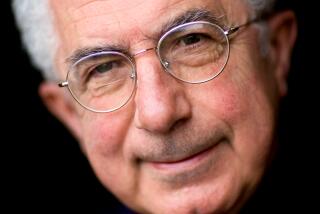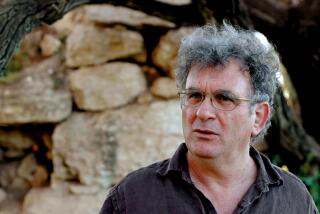A Summation of Cutting-Edge Bible Scholarship
- Share via
Bible scholar Thomas L. Thompson makes a remarkable disclosure at the outset of his latest book, “The Mythic Past.” The author reveals that, starting in 1975, he spent nearly a decade working as a house painter and a handyman because his scholarship was so controversial that no university would hire him. Only after the rest of the academic world caught up with his revolutionary ideas about the origins and meanings of the Bible was Thompson invited back into the groves of academe.
“We can say now with considerable confidence that the Bible is not a history of anyone’s past,” Thompson writes in “The Mythic Past,” summing up the arguments that were once regarded as radical and even heretical. “The question of origins which has dominated modern research into the Bible belongs to theology rather than to history.”
Nowadays, Thompson holds a professorship at the University of Copenhagen, and the revisionism that got him into such trouble in the 1970s is the conventional wisdom of Bible scholarship. But Thompson is a man with a fiery nature and a sharp pen, and even when he is summing up what has become conventional wisdom, he insists on expressing himself in provocative and even inflammatory ways.
“The Bible’s ‘Israel’ is a literary fiction,” he writes.
“Not only have Adam and Eve and the flood story passed over to mythology, but we can no longer talk about a time of the patriarchs. There never was a ‘United Monarchy’ in history and it is meaningless to speak of pre-exilic prophets and their writings. . . . The Bible deals with the origin traditions of a people who never existed as such.”
Thompson is a man on a mission--he seeks to correct what he regards as the false ideas and false methods that have tainted the whole enterprise of Bible scholarship. Thus, for example, he prefers to use the phrase “Palestinian archeology” in place of “biblical archeology” because the latter phrase assumes that what is dug out of the ground will corroborate what is found in the pages of the Bible. Thompson insists with all the passion of a true believer that no such archeological evidence has been or is likely to be found, precisely because the Bible was never intended by its original authors as a work of history.
“It is a fundamental error of method to ask first after a historical David or Solomon,” writes Thompson. “Finding an archeological Jerusalem fit for a David, for example, is proving just as difficult and more embarrassing than it was to find an archeologically suitable . . . Jericho for a Joshua three generations ago.”
If the Bible is not history, then what is it? Here Thompson comes to a conclusion that even open-minded readers may find off-putting.
The Bible “was formed of a collation of early West Semitic monotheistic traditions,” he writes. “It was never written for us, and can hold false--when not falsified--messages for us. A contemporary theology that would see itself based on the themes, metaphors and motifs of Old Testament stories and poems is a highly artificial, and one must also say, a highly arbitrary, exercise.”
Thompson’s book will not come as a shock to anyone who has already found his or her way to the growing body of scholarly and popular writing on the subject of biblical revisionism, including, for example, Donald Harman Akenson’s “Surpassing Wonder” and Alan Dundes’ “Holy Writ as Oral Lit.” But “The Mythic Past” is such an impressive summing-up of the cutting edge of modern Bible scholarship, and Thompson writes with such clarity, energy and fervor, that he will surely enlighten and challenge anyone who dares to crack open his book.
Jonathan Kirsch, a contributing writer to the Los Angeles Times Book Review, is the author, most recently, of “Moses, a Life” (Ballantine).
More to Read
Sign up for our Book Club newsletter
Get the latest news, events and more from the Los Angeles Times Book Club, and help us get L.A. reading and talking.
You may occasionally receive promotional content from the Los Angeles Times.










